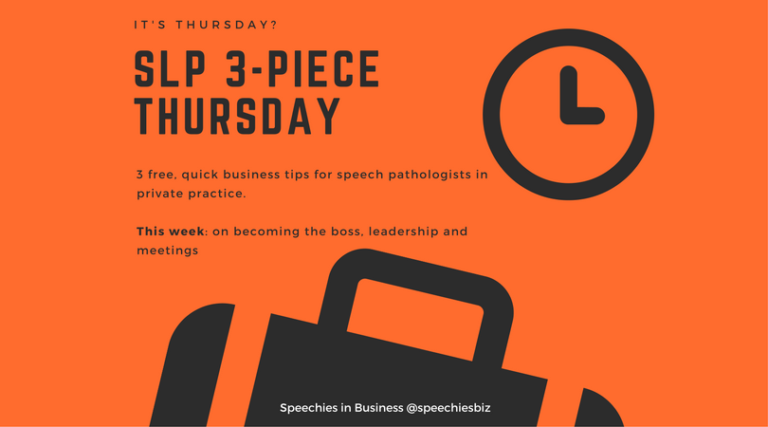Australian speech pathologists: is it ethical to hire juniors as independent contractors?
For speech pathologists in private practice, hiring independent contractors seems cheaper and more flexible than hiring employees, e.g. if your practice has unpredictable workflows or seasonal “slow” and “busy” periods.
But there are a raft of ethical, client and commercial reasons why it may make more sense to grow your practice with employees. There are also compelling legal reasons not to go down the independent contracting route – at least without first understanding all the risks.
A. Not a new issue
I’ve addressed independent contracting arrangements in speech pathology private practice before. It’s one of those issues I come across regularly – especially with new graduates calling me for guidance about their “first job” contracting arrangements (often after signing on the dotted line).
As a profession, I think independent contracting and ethical employment practices are important topics to address openly.
B. Update
Recently, we enjoyed an excellent talk by lawyer Anna Elliott about the differences between contractors and employees*. Interestingly, the talk focused on the downsides of getting the employee-independent contractor decision wrong.
Here are some of our key takeaways from Anna’s talk, which we consider highly relevant to Australian speech pathology private practices:
1. Whatever you call your hire (independent contractor or employee), you can’t guarantee a Court or regulator will agree.
- Even with good lawyers and great contracts, there is nothing you can do to guarantee your contractor is really (legally) a contractor.
- The label you use to describe the worker in the contract is relevant, but doesn’t determine the answer on its own.
- If there is a dispute (e.g. with a worker), a Court will look at all of the facts and circumstances to figure out if someone you are calling an independent contractor is really a contractor or an employee.
- There’s a long list of factors Courts look at when deciding whether a hire is a contractor or employee (we’ve talked about some of them before). They include whether the hire:
- has control over her/his work (freedom to decide how, when and where the services are performed);
- can delegate or subcontract their work to others (i.e. can the hire delegate their work to another person);
- is free to engage in other business activities and provide other services to others;
- is really an entrepreneur who owns and operates their own business; and
- is really working for and representing their business (and not yours).
As speech pathologists, let us pause for a second and think about the realities of some common contracting arrangements in our profession:
I’ve seen some arrangements – e.g. involving the short term hire of senior/experienced speech pathologists in practice for themselves to cover for principals or staff on leave – where these factors are present.
I’ve seen (many more) arrangements – particularly involving new graduates and junior members of the profession – that do not satisfy any of these factors, exposing the hirer to the real legal risk that the worker is legally an employee (see below).
I’ve also seen several terribly drafted “independent contractor” contracts in the market where employee and independent contracting concepts are hopelessly muddled. Again, the risks of these arrangements lie mostly with the hirer (see below).
- Different Courts attach different weight to factors/indicators in different cases.
- Different regulators (e.g. the Australian Taxation Office (ATO)) have their own tests for when they think someone is a contractor.
- Different laws define contractors and employees differently for different purposes.
Example: hirers are liable to pay superannuation entitlements for employees and for contracts wholly or principally for the labour of an individual (i.e. where more than 1/2 the contract value is for the worker’s labour, whether physical, mental or artistic). This means that, in some cases, you may be liable for a speech pathologist’s superannuation payments, even if the person is an independent contractor.
See, the ATO’s information about contractors and superannuation.
Key and recent employee/contractor cases:
- Hollis v Vabu Pty Limited 207 CLR 21 (High Court of Australia)
- On Call Interpreters and Translators Agency Pty Ltd v Commissioner of Taxation [2011] FCA 366 (Federal Court of Australia)
- Tattsbet Limited v Morrow [2015] FCAFC 62 (Full Federal Court of Australia)
- Fair Work Ombudsman v Quest South Perth Holdings Pty Ltd ([2015] FCAFC 37 Full Federal Court of Australia and [2015] HCA 45 High Court of Australia).
2. In any event, is it ethical or commercially sensible to allow unsupervised junior independent contractors to work with your clients?
One of the (many) factors Courts look at to decide if a person is an employee or contractor is whether a worker is or has been supervised by the hirer. Employees are generally supervised by their employers because employers are usually liable for employees’ work. However, true independent contractors are expected to receive no or little supervision.
Clause 3.3.4 of Speech Pathology Australia’s (SPA) Code of Ethics deals with supervision. Among other things, it says SPA members:
- provide appropriate supervision;
- accept responsibility for clinical and support staff, students and volunteers who are assigned to us;
- take reasonable steps to ensure that those clinical staff and students under our supervision:
- understand and apply the Ethics Code; and
- operate within their level of competence; and
- demonstrate and discuss ethical practice with those we supervise to facilitate their ethical reasoning skills.
Not supervising an inexperienced speech pathologist who is working with your clients is a recipe for disaster. Deciding not to supervise a hire (e.g. to help ensure the hire is seen as an independent contractor) may conflict with:
- your ethical duties to clients and to SPA;
- your consumer rights-based duties to clients to ensure you are providing a fit and proper service;
- your insurance obligations to your professional indemnity insurer; and
- your commercial objective to protect your reputation and the reputation of your practice.
This is especially the case with junior members of the profession – and, in particular, with new graduate speech pathologists.
3. If you get it wrong, it can be expensive for your practice (and for you personally).
If you think you’ve hired a contractor and, down the track, the worker or a regulator claims the worker is or was really your employee, you may be liable for:
- unpaid employment entitlements (e.g. annual leave, reasonable notice, and civil penalties for breaches of the National Employment Standards);
- Pay As You Go (PAYG) tax penalties up to 100% of the tax that should have been withheld;
- civil penalties for sham contracting arrangements (It’s an offence to represent that an employment contract is an independent contracting arrangement (also known as a contract for services). This is known as “sham contracting”.);
- damages for breach of contract;
- unfair dismissal claim (reinstatement or up to 6 months salary); and/or
- uncapped damages/civil penalties for “adverse action penalties”.
For example, in a 2015 case, the employer company was hit with a penalty of almost $200,000 and the director was fined over $35,000 personally for sham contracting, failure to pay superannuation, holiday, weekend and casual loadings and failure to keep records. (It could have been twice as much if the employer hadn’t admitted contraventions, or if it had involved more than one employee.)
Some of these risks – e.g. sham contracting and unpaid entitlements – remain risks for 6 years from when they first arise. Others may remain for even longer than this.
These risks can also affect your ability to sell your practice, e.g. you might have to give the buyer an indemnity for these risks, and you can’t contract out of statutory obligations.
4. Even “true” independent contractors may be able to claim against you if they think their contract is “harsh or unfair”.
The Independent Contractors Act 2006 (Cth) gives the Federal Court of Australia (on the application of an aggrieved worker) the ability to review contracts that are harsh or unfair, e.g. because:
- the bargaining power of the hirer was much stronger than the contractor, and the hirer used their better bargaining position to put undue pressure on the contractor; or
- you are paying the independent contractor less than they would have received as an employee.
This exposes hirers of independent contractors to additional risks, especially if hiring inexperienced new grads with little bargaining power and not paying them enough.
Read the recent cases:
- Keldote Pty Ltd & Ors v Riteway Transport Pty Ltd [2008] FMCA 1167
- Informax International Pty Limited v Clarius Group Limited (No.2) [2011] FCA 934
5. Hiring staff through labour hire companies is also risky.
In some industries, hirers have attempted to reduce some of the above legal risks by hiring staff through labour hire companies. These are arrangements where the hirer engages the labour hire company to supply staff.
While these arrangements may reduce some risks (e.g. superannuation liabilities), they don’t eliminate others. For example, in the recent Quest case, the High Court of Australia found that using a labour hire company did not eliminate a hirer’s risk of being found to have engaged in sham contracting arrangements.
Politically, labour hire companies have come under significant parliamentary scrutiny recently, including in Queensland, Victoria and South Australia.
With the ongoing “Uberfication” of service jobs (including speech pathology), we expect that labour hire companies and the businesses that use them will remain under the spotlight for the foreseeable future.
Bottom line
Speech pathologists who hire independent contractors to work with their clients need to know about the risks. Some legal risks can be reduced by using good quality contracts. But the conduct of the parties – the “real world reality” of the situation – must be consistent with the intended/stated relationship. Regulators and Courts look at all the facts and circumstances to assess whether a hire is really a contractor or an employee. Getting it wrong can be very expensive.
Hiring contractors to provide speech pathology services to staff also gives rise to ethical and commercial risks. These include how to delegate to and supervise staff adequately (especially junior staff), how to monitor the quality of your services, and to protect your reputation.
There are no easy answers here; and I’m not suggesting that the use of independent contracting arrangements in our industry should cease. But speech pathologists who want to hire contracting staff to grow their business should first educate themselves on the legal risks (and take legal advice if unsure), think through the ethical issues, and consider the commercial pros and cons (including to team morale and reputation).
What do I do in my practice to manage these risks? At the moment, I hire staff as employees.
Principal source: * Elliott, A. (2016). “Contractor v Employee: Getting the Relationship Right and the Consequences of Getting it Wrong”. College of Law online course, watched on 17 March 2017.
Important disclaimer: The information in this article is for general information purposes only and is not legal advice. It is current as at its date of publication. It cannot be relied on by any person for any purpose. If this issue raises any issues for your practice, you should seek independent legal advice based on the facts and circumstances of your situation. The application of laws and statutes may vary depending on the circumstances. We do not assume any liability for any damage that may be caused to anyone as a result of any act or omission on the basis of the information contained in this article.
Image: https://tinyurl.com/l3hcdgt








